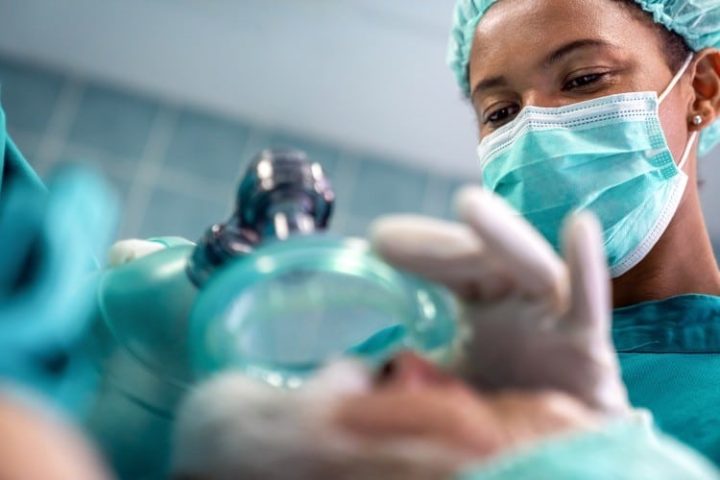
Scotland has become the first nation to ban the use of desflurane, a common and effective drug used in medical anesthesia. Desflurane has been banned in Scotland as of March of this year because of its alleged link to global warming. England’s National Health Service will, likewise, ban use of the drug beginning in 2024.
Anesthetic gasses such as desflurane and sevoflurane are considered hydrofluorocarbons (HFCs), the same type of gasses which, allegedly, caused a hole to grow in Earth’s ozone layer decades ago. The ozone hole conspiracy has long since been supplanted by climate change as the world’s foremost environmental bogeyman.
The European Union also plans to discontinue use of the drug in 2026 unless it is strictly required and no other anesthetic can be used.
The ban on the drug is a part of Scotland’s National Green Theatres Programme, an effort aimed at creating a “net zero” health service in Scotland.
According to Scotland’s NHS, halting the use of this beneficial drug will create no dire consequences for patients and will drastically cut down on harmful climate emissions.
“Stopping the use of Desflurane across NHS Scotland, with use allowed only in exceptional clinical circumstances, has already reduced harmful emissions by around 6.17 kilo tons of carbon a year — the same as powering 1,700 homes every year,” NHS Scotland claimed in a statement.
“Over the course of a year, emissions saved through the elimination of Desflurane would be equivalent to driving around the earth 740 times or driving between Glasgow and London 42,500 times,” NHS Scotland declared.
The Scottish government assures citizens that patient safety is not an issue with the new ban.
“Programmes like this are key to our transition to become a net-zero health service, whilst ensuring patient safety remains at the heart of every clinical decision,” said Cabinet Secretary for Health and Social Care Humza Yousaf.
According to proponents of the ban, ceasing the use of desflurane across the entire U.K. will be equivalent to cutting the emissions caused by powering 11,000 homes every year.
“I realized in 2017 that the amount of desflurane we used in a typical day’s work as an anesthetist resulted in emissions equivalent to me driving 670 miles that day,” said Dr. Kenneth Barker, an anesthetist and the clinical lead for Scotland’s National Green Theatres Programme. “I decided to stop using it straight away and many fellow anesthetists have got on board.”
“When you are faced with something as obvious as this and with the significance it has to the environment — I am very glad we have got to this stage,” Barker added.
The ban on desflurane has the United Nations and “Great Reset” written all over it.
“This was an area of focus in our policies, which we published in 2022,” said Laura Wilson of the Royal Pharmaceutical Society of Scotland. “We specifically highlighted desflurane as the most dangerous inhalation agent and are pleased that a ban on this gas will encourage the use of more sustainable anesthesia.”
So, the ban is supposedly “climate friendly,” but is it patient friendly? There is a reason that desflurane is so widely used as an anesthetic.
“[Desflurane] has a rapid recovery, meaning patients would ‘wake up’ faster at the end of the operation, compared to previous inhaled agents like isoflurane,” said Roddy Chapman, who is consulting anesthetist and the deputy clinical director for anesthetics at the Golden Jubilee University National Hospital in Clydebank, Glasgow.
A quicker wake-up from surgery sounds like an important factor in the use of anesthesia, especially since the practice is so fraught with potential complications; among them profound confusion, pneumonia, stroke, or heart attack.
Desulferane is also widely used as a maintenance anesthesia which can be used in order to keep a surgery patient “asleep” while the surgery is ongoing. It keeps the patient from “waking up” during the surgery.
“About once in every 1,000 to 2,000 surgeries, patients may gain some awareness when they should be unconscious. They may hear the doctors talking and remember it afterward. Worse yet, they may feel pain but be unable to move or tell the doctors,” The NHS itself proclaims.
The NHS doesn’t address whether the ban on desflurane will increase the possibility of that horrifying scenario occurring.
But with the climate cult, questions such as “is the ban the best thing for the patients” are secondary to virtue signaling about emissions. Such inquiries are subordinate to reducing emissions at all costs — even human costs. The motto of the climate hysterics at NHS Scotland can be condensed into one sentence: Ban first and discuss consequences later.




